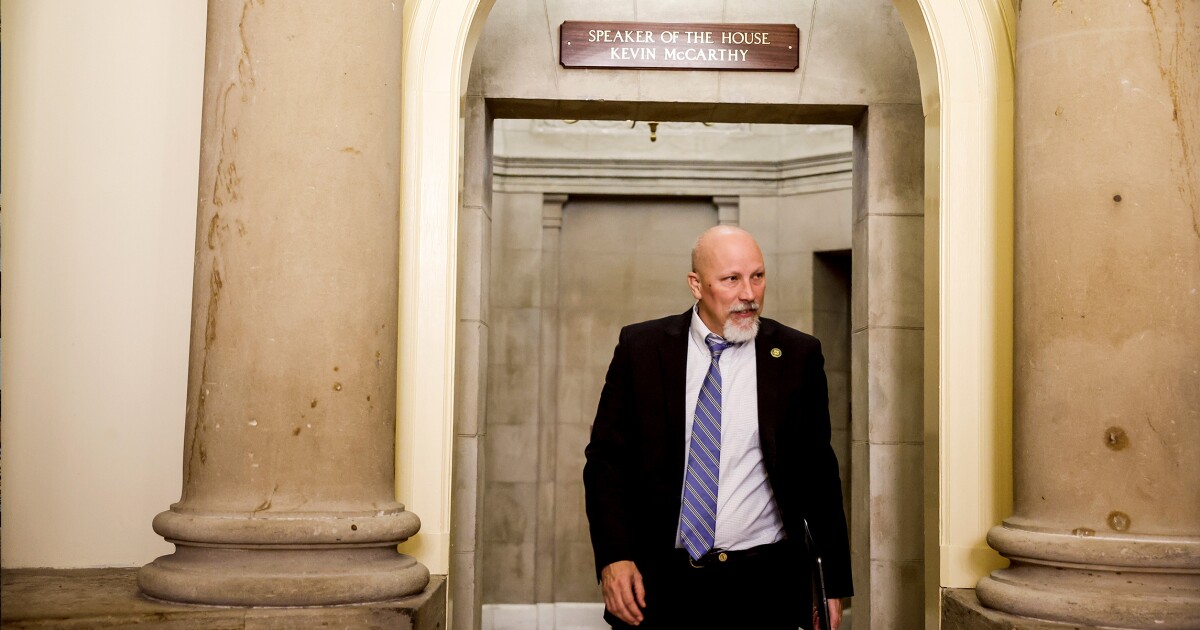

The House Rules Committee hearing room in the Capitol lacks the grandeur and ornate decorations of those often seen in televised hearings. A quick staircase walk or elevator ride up from the House floor, the tight-for-space and utilitarian room more resembles a city council’s chambers or a school board setting.
But looks can be deceiving. The House Rules Committee is poised to play a key role in deciding which pieces of legislation get considered on the House floor and what, if any, amendments are allowed.
CONGRESS BRACES FOR PARTISAN CHALLENGES TO ADVANCE MUST-PASS LEGISLATION
The 118th Congress’s House Rules Committee also has a type of Republican membership, at least in part. With Republicans holding a narrow 222-213 majority, the committee, for the first time in decades, will include members with political agendas differing markedly from their party leadership.
That was among the costs of winning the House’s top job for Speaker Kevin McCarthy (R-CA), who claimed the gavel in January after making several concessions to the chamber’s most raucous lawmakers. This includes putting on the House Rules Committee members of the House Freedom Caucus and their allies, who have often been thorns in the side of McCarthy and his Republican leadership team.
While the committee’s membership composition may sound like congressional insider baseball, it’s likely to have a profound effect on legislation making it out of the House. With President Joe Biden in the White House and Democrats holding a 51-49 Senate majority, more conservative-leaning bills that pass the House could make for tougher negotiations and compromise in a divided government.
That may be the point for a clutch of conservative House members who are skeptical of government spending and other actions. Yet some pieces of legislation must eventually be enacted, including raising the nation’s debt ceiling and, in turn, avoiding default on U.S. debt for the first time, which likely would trigger a global financial crisis.
Now the speaker’s committee in name only
It took 15 rounds of ballots on the House floor, and three-and-a-half days, for McCarthy to secure the speakership. And conservatives’ insistence on mixing up the committee’s membership put the panel in the spotlight for the first time since the early days of the House Democrats’ 40-year run in the majority, from 1955 to 1995.
Back then, the House Rules Committee had considerably more power to the point that House Speakers Sam Rayburn (D-TX) and John McCormack (D-MA) in the late 1950s and into the 1960s had to beg and plead with their own members on the committee to vote the party line. Segregationist Democratic House Rules Committee chairmen for years used the committee to bottle up civil rights legislation before the impasse was finally broken with President Lyndon Johnson in the White House.
Fast forward to the aftermath of the 1994 Republican Revolution, which produced the first GOP majority in 40 years, and the House Rules Committee has been strictly the domain of the speaker. Once in power, Speaker Newt Gingrich (R-GA) made sure to appoint loyalists to the panel, which consisted of nine members of the majority party and four from the minority. This means the majority will never lose a vote, even if there’s a very occasional defection.
Subsequent Republican speakers consolidated even more power in party leadership, as did Rep. Nancy Pelosi (D-CA) in her pair of stints as House speaker (2007-11 and 2019-23). A legislative control freak by nature, Pelosi in the House Rules Committee (and other realms) ensured spots were given only to her most loyal members.
This is why the House Rules Committee has long been known as the speaker’s committee. That has now changed since McCarthy, while technically appointing all GOP members, was forced to choose lawmakers who would never have previously made it, including those from the House Freedom Caucus.
As part of his concessions to become speaker, McCarthy agreed to add three conservatives to the committee who don’t always play nicely with leadership, including House Freedom Caucus members Reps. Chip Roy (R-TX) and Ralph Norman (R-SC), as well as Rep. Thomas Massie (R-KY), who is not in the group but frequently votes with his colleagues who are.
The group of lawmakers said they wanted to use their new positions to enforce a more “open” House when it comes to introducing and voting on legislation. Part of this includes reviving the use of “open rules,” allowing any lawmaker to propose an amendment before the legislation is introduced on the floor.
Roy and Norman also said they plan to use their new positions on the committee to ensure the House does not forgo process agreements by passing single-subject bills or releasing bill language just hours ahead of a final vote, a favorite practice of both Republican and Democratic speakers in recent years.
Massie has proposed similar conditions. However, his loyalty might not be so easy to predict. The Kentucky Republican has a reputation for pushing back against legislation to be the stand-alone “no” vote, earning him the nickname “Mr. No.”
However, Massie has vowed not to be a constant naysayer in his position on the House Rules Committee — so long as House Republican leaders can keep their promises.
The House Rules Committee’s 9-4 split in the Republicans’ favor means Roy, Norman, and Massie could use that to their advantage and thwart plans by McCarthy and his leadership team by standing together as an independent faction to negotiate their own rules at the expense of their Republican counterparts.
The trio was among McCarthy’s staunchest holdouts during his speakership bid in January, leading to the 15 rounds of voting before the California Republican was elected — the longest it has taken since before the Civil War. The vote prompted criticism among Democrats, who pointed to the dayslong process as evidence of a disunified majority.
A whole new rules world
Now, with several of the McCarthy holdouts wielding power on the House Rules Committee, past members suggest the protracted speakership vote was just a preview of what’s to come.
“This is an unusual situation because you don’t know how some of these new members are going to behave, even though they are Republicans. They may not always be loyal to the speaker,” said former Rep. Martin Frost (D-TX), a member of the House Rules Committee throughout his 1979 to 2005 tenure representing a suburban Dallas district. “I don’t know how McCarthy is going to handle it.”
Frost was the ranking House Democratic member for three-and-a-half years in the latter part of his quarter-century House career. Having joined the panel when Speaker Tip O’Neill (D-MA) led the House, Frost recalled the committee working in a very routine fashion: When Republicans were in charge, GOP members were responsive to their leadership and vice versa for Democrats.
But now, he said, Congress is in an “uncharted situation.”
“Maybe [McCarthy’s] worked all this out in advance, but I haven’t seen any indication that that’s happened yet,” Frost told the Washington Examiner. “And I think that it will be an embarrassment for the Republicans.”
Republicans have pushed back on those criticisms, arguing the election process was merely representative of the chamber’s democratic process.
“[McCarthy’s] got a very diverse House majority that he’s working with,” said former Rep. Tom Reynolds (R-NY), a House Rules Committee member during his 1999-2009 House career, representing a suburban Buffalo, New York, district. “I think the Rules Committee is reflective of what the House Republican conference is about.”
However, Reynolds conceded that bipartisan legislation is not likely to make it through the House anyway, especially with the GOP’s narrow 222-213 majority.
That could affect the Republicans’ chances of maintaining control of the lower chamber come 2024, according to Frost. That’s especially true when it comes to legislation that must be passed by Congress in order to keep the government functioning, such as the debate over raising the debt ceiling to avoid defaulting on the country’s loans.
CLICK HERE TO READ MORE FROM THE WASHINGTON EXAMINER
“Since they have such a small majority, they have to show that they can actually legislate [and that] they can get things done,” he said. “The first indication of that will be how the Rules Committee handles major legislation.”
All of this means there will be plenty of action in the small committee room just upstairs from the House floor — one that previously didn’t attract much public notice but is now likely to be the center of legislative attention.






